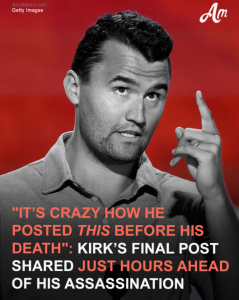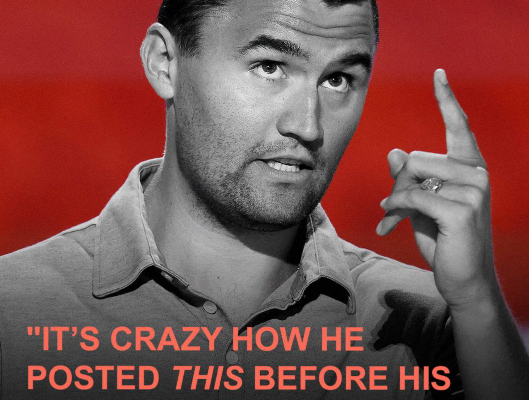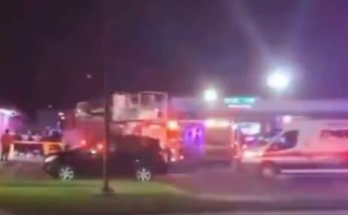 Charlie Kirk’s Final Post: A Warning, a Tragedy, and a Nation on Edge
Charlie Kirk’s Final Post: A Warning, a Tragedy, and a Nation on Edge
On the morning of September 10, 2025, Charlie Kirk—conservative activist, founder of Turning Point USA, and a prominent voice among young American conservatives—published what would become his final social media post. Just hours later, he was fatally shot during a campus event at Utah Valley University. The timing of his post, its content, and the circumstances of his death have sparked widespread reflection, debate, and a haunting sense of foreboding.
This essay explores the meaning behind Kirk’s final message, the political and emotional context in which it was shared, and the broader implications of his untimely death.
The Final Post: A Call to Politicize Tragedy
Kirk’s last post, published on X (formerly Twitter), addressed the murder of Iryna Zarutska, a 23-year-old Ukrainian refugee who was fatally stabbed on a Charlotte light rail train in August 2025. The suspect, Decarlos Brown Jr., had 14 prior offenses and was released under what Kirk described as a “broken” criminal justice system.
“If we want things to change,” Kirk wrote, “it’s 100% necessary to politicize the senseless murder of Iryna Zarutska because it was politics that allowed a savage monster with 14 priors to be free on the streets to kill her”.
The post included a video of White House spokesperson Karoline Leavitt discussing the case, and it quickly gained traction among Kirk’s followers. Many saw it as a passionate plea for reform, while others criticized it as opportunistic. But regardless of interpretation, the message was clear: Kirk believed that systemic failures—enabled by political decisions—had led to preventable violence.
The Chilling Echo: “America Will Never Be the Same”
On Instagram, Kirk shared a screenshot of the same tweet, overlaying it with a photo of Zarutska and the caption: “America will never be the same”. The phrase, stark and ominous, now reads like a prophecy. Commenters were quick to note the eerie parallels between Zarutska’s death and Kirk’s own—both victims of sudden, violent attacks, both struck in the neck, both mourned as symbols of a broken system.
“She got stabbed in the neck and you got shot in the neck! WTH going on???” one commenter wrote. Another added, “She didn’t deserve this. You didn’t either @charliekirk1776 💔 Rest in glory 🙌🏻 Praying for your family 🙏🏻❤️🩹😢”.
The emotional weight of these posts has transformed them from political statements into communal rituals of mourning. They are now part of the visual and emotional archive of Kirk’s legacy.
A Life of Provocation and Purpose
Charlie Kirk was no stranger to controversy. Since founding Turning Point USA in 2012 at the age of 18, he had built a reputation as a firebrand conservative, known for his campus tours, viral debates, and unapologetic critiques of progressive ideology. His podcast, “The Charlie Kirk Show,” reached millions, and he was a frequent guest on Fox News and other conservative platforms.
Kirk’s style was confrontational but calculated. He framed political debates as moral battles, often invoking religious language and patriotic imagery. His final post was no exception—it was a call to arms, a demand for accountability, and a rejection of what he saw as political complacency.
The Event: A Fatal Moment of Dialogue
Kirk was shot while speaking at a “Prove Me Wrong” event at Utah Valley University. The format, which invited audience members to challenge his views, was emblematic of his approach to discourse: bold, direct, and public.
Just moments before the shooting, Kirk was responding to a question about transgender mass shooters in America. “Too many,” he replied, before elaborating on gang violence and broader crime statistics. Seconds later, a single shot rang out. Kirk recoiled in his seat, and the crowd erupted in panic.
The shooter, later identified as 22-year-old Tyler Robinson, had fired from a rooftop 130 meters away. He fled into nearby woods, leaving behind a bolt-action rifle engraved with cryptic messages, including “Bella ciao” and “Hey fascist! Catch!”.
Erika’s Post: A Sense of Foreboding
Adding to the emotional gravity of the day was a post by Kirk’s wife, Erika Frantzve. Just two hours before the shooting, she shared a verse from Psalm 46:1: “God is our refuge and strength, a very present help in trouble”.
The timing of her post has led many to speculate that she sensed something was wrong. Erika and their two children were present at the event, making the tragedy even more personal and devastating.
Commenters responded with empathy and awe: “The fact that you posted this before the event is a testament of the Lord,” one wrote.
Political Reverberations
Kirk’s death has ignited a firestorm of political reaction. President Donald Trump confirmed the news on Truth Social, calling Kirk “The Great, and even Legendary” and stating, “No one understood or had the Heart of the Youth in the United States of America better than Charlie”.
Vice President J.D. Vance, Utah Senator Mike Lee, and California Governor Gavin Newsom all condemned the violence, with Newsom tweeting, “In the United States of America, we must reject political violence in EVERY form”.
The bipartisan response underscores the gravity of the moment. Kirk’s death is not just a loss for conservatives—it’s a national tragedy that has reignited debates about free speech, political safety, and ideological extremism.
The Legacy: A Final Message That Became a Mirror
Charlie Kirk’s final post was meant to provoke, but it has become a mirror. It reflects the tensions, fears, and unresolved questions that define American politics today. It challenges us to consider the consequences of systemic failure, the role of political discourse, and the fragility of public life.
In death, Kirk’s message has taken on new meaning. It is no longer just a critique of the justice system—it is a symbol of the risks faced by public figures, the emotional toll of political engagement, and the haunting unpredictability of violence.
Conclusion: A Warning Etched in Time
Charlie Kirk’s final post, published just hours before his death, now stands as a chilling warning and a poignant farewell. It captured his convictions, his urgency, and his belief in the power of political action. But it also revealed the vulnerability of those who speak boldly in a divided world.
As America mourns Kirk’s passing, his last words continue to echo. They remind us that politics is not just policy—it is people, pain, and the pursuit of change. And in that pursuit, the line between courage and danger is often heartbreakingly thin.



